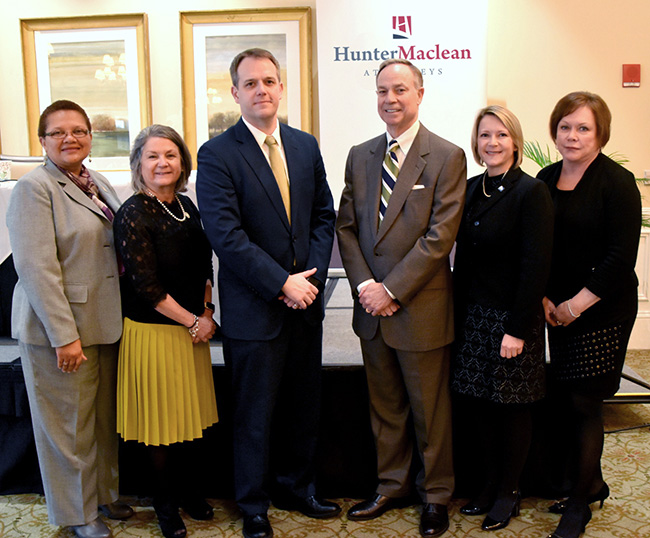By Katie Nussbaum, as published in the Savannah Morning News

From billions in economic impact to the creation of a bamboo toothbrush, education leaders gathered on Wednesday to discuss the impact the Coastal Empire’s public higher education institutions have on Savannah and surrounding counties during HunterMaclean’s Critical Issues Forum at the Savannah Golf Club.
The panel included Cheryl Dozier, president, Savannah State University; Michelle R. Johnston, president, Coastal College of Georgia; Kathy Love, president, Savannah Technical College; and Shelley Nickel, interim president, Georgia Southern University.
The discussion was moderated by University System of Georgia, Board of Regents, Chairman Don Waters.
Economic impact
The University System of Georgia’s 26 institutions contributed nearly $17 billion in economic impact across the state in FY 2017, according to the annual economic impact report released by the Board of Regents of the University System of Georgia late last year and more than $1.3 billion of that was represented on Wednesday.
Coastal College contributed $97.8 million and 1,143 total jobs – 322 on-campus and 821 off-campus across Glynn, Brantley, McIntosh, Camden, and Wayne counties in FY17.
“In a small area that’s isolated a bit population-wise that’s a big splash and we’re really proud of that,” Johnston said of the jobs.
Georgia Southern’s impact was just over $1 billion and was bolstered during the year due to the consolidation between GSU and Armstrong State University.
The university accounted for 11,535 jobs, 3,543 on-campus and 7,992 off-campus across Bulloch, Screven, Candler, Emanuel, Evans, Tattnall, Jenkins, Chatham, Effingham, Bryan, and Liberty counties.
Savannah State contributed $187 million and accounted for 2,056 jobs – 605 on-campus and 1,451 off-campus. The impact was felt across Chatham, Effingham, Bryan, Liberty and Bulloch counties.
Savannah Tech, which is a part of the Technical College System of Georgia, contributed $64 million, but Love also sites the additional earnings of the school’s graduates since job placement and workforce development are the driving forces behind the school.
The estimated additional earnings in 2017 topped $32 million, she said.
Successes, looking ahead
Combined, the four school’s account for more than 40,000 students and while their ages, majors and other demographics vary, what the schools do have in common is the successes of those students.
Dozier cited several alumni successes, including General Scientific Corporation and Jetaire Group, which was founded by Michael Williams.
“This is a major company that has business relationships with NASA, the Department of Homeland Security and across 52 counties,” Dozier said of Jetaire, which is a full-service avionics and aircraft engineering firm.
Johnston’s example of student success was a bit more personal – a bamboo toothbrush. Created by recent graduate Kynder Ganoe, the toothbrushes aim to help combat plastic waste.
“That is so emblematic of the kinds of creativity, service mindedness and impact that our students have,” Johnston said.
In order to keep those graduates here and working Nickel said it’s all about being flexible and meeting the needs of students as they evolve.
“I don’t think there will be as many people in the future who can give up five or six years of their lives to go to college away from a job, so what the community can do is send more students starting in high school to dual enrollment and get them engaged in college life,” she said.
“…The community can play a role in that by providing jobs for students while they’re in school, so that’s what I see as the wave of the future.”




